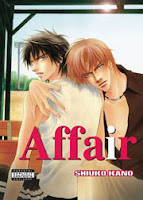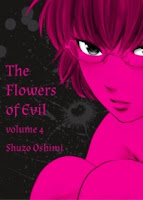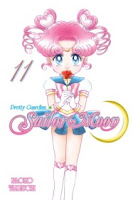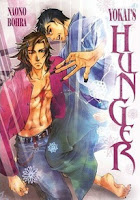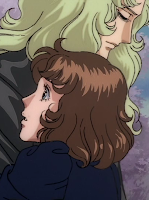My News and Reviews
The Boys’ Love Manga Moveable Feast, hosted by Khursten of Otaku Champloo, is in full swing. Khursten is doing a fantastic job hosting the Feast; I highly recommend checking out her posts! I myself posted a couple of contributions to the Feast last week. The most recent manga giveaway at Experiments in Manga is for Shiuko Kano’s boys’ love collection Affair. The winner will be randomly selected and announced on Wednesday, so there’s still time to enter! I also devoted my first in-depth manga review of the month to Tomoko Yamashita’s Black-Winged Love. I tried to explain why it’s one of my absolute favorite collections of short manga. (July’s Bookshelf Overload was also posted last week. Although it’s not really a part of the Feast, it does include some boys’ love on the list.) Finally, as you can see below, I spent last week reading a bunch of boys’ love manga by Yugi Yamada. I really enjoy her sense of humor, cranky characters, and bickering (but loving) couples. Oh, and I also watched Gravitation.
Quick Takes
 Dry Heat by Yugi Yamada. I don’t think that Dry Heat shows Yamada at her best, but it is still an engaging read. Dry Heat has an odd mix of tones. The story itself is quite serious with a tendency towards the melodramatic, but there is a fair amount of humor included as well. It’s as though Yamada couldn’t quite decide whether the manga should be a comedy or a drama. Sometimes the balance works and sometimes it doesn’t. The plot is a little over the top and stretches believability in places and I can’t say that I was particularly convinced by the romantic interests, but Dry Heat does have some really great moments. Dry Heat is in turns touching, exasperating, and very funny.
Dry Heat by Yugi Yamada. I don’t think that Dry Heat shows Yamada at her best, but it is still an engaging read. Dry Heat has an odd mix of tones. The story itself is quite serious with a tendency towards the melodramatic, but there is a fair amount of humor included as well. It’s as though Yamada couldn’t quite decide whether the manga should be a comedy or a drama. Sometimes the balance works and sometimes it doesn’t. The plot is a little over the top and stretches believability in places and I can’t say that I was particularly convinced by the romantic interests, but Dry Heat does have some really great moments. Dry Heat is in turns touching, exasperating, and very funny.
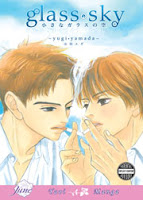 Glass Sky by Yugi Yamada. Glass Sky is a great collection of short boys’ love manga ranging from the bittersweet to the almost cheerful with a few laugh out loud moments. The strongest selection in the volume is the titular “Glass Sky.” It’s a rough and intense story, but very, very good. Dealing with bullying and violence, it’s the most sobering story in Glass Sky and is especially shocking since it follows some of the more lighthearted pieces. I was surprised to recognize characters from Yamada’s earlier one-shot manga Laugh Under the Sun in several of the stories in Glass Sky. However, it’s not at all necessary to have read it in order to appreciate their stories. (Although if you have, Glass Sky does provide a little more insight into the characters—Naoki, especially.)
Glass Sky by Yugi Yamada. Glass Sky is a great collection of short boys’ love manga ranging from the bittersweet to the almost cheerful with a few laugh out loud moments. The strongest selection in the volume is the titular “Glass Sky.” It’s a rough and intense story, but very, very good. Dealing with bullying and violence, it’s the most sobering story in Glass Sky and is especially shocking since it follows some of the more lighthearted pieces. I was surprised to recognize characters from Yamada’s earlier one-shot manga Laugh Under the Sun in several of the stories in Glass Sky. However, it’s not at all necessary to have read it in order to appreciate their stories. (Although if you have, Glass Sky does provide a little more insight into the characters—Naoki, especially.)
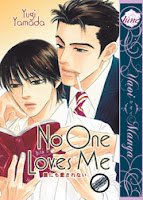 No One Loves Me by Yugi Yamada. I really enjoyed No One Loves Me. It’s one of my favorite manga by Yamada. Katsuhiro is a subdued and awkward book lover and used book store owner with a particular interest in Czech literature. The much brasher Masafumi is in the sales department of a publishing house but is thrust into a translation project as Katsuhiro’s editor. Their relationship, professional and otherwise, has its ups and downs and is wonderful to watch unfold. No One Loves Me isn’t as outrageously funny as some of Yamada’s other manga, but there’s still plenty of humor. Plus, the incorporation of the love of books into the story is a nice bonus and something that I particularly appreciated.
No One Loves Me by Yugi Yamada. I really enjoyed No One Loves Me. It’s one of my favorite manga by Yamada. Katsuhiro is a subdued and awkward book lover and used book store owner with a particular interest in Czech literature. The much brasher Masafumi is in the sales department of a publishing house but is thrust into a translation project as Katsuhiro’s editor. Their relationship, professional and otherwise, has its ups and downs and is wonderful to watch unfold. No One Loves Me isn’t as outrageously funny as some of Yamada’s other manga, but there’s still plenty of humor. Plus, the incorporation of the love of books into the story is a nice bonus and something that I particularly appreciated.
 Open the Door to Your Heart by Yugi Yamada. One of my favorite Yamada manga is Close the Last Door, a short two-volume series. Open the Door to Your Heart is a one-volume side story which slightly overlaps, following the two older Honda brothers. I didn’t like Open the Door to Your Heart nearly as well, but still enjoyed parts of the manga. It was nice to get to know the Hondas better, both the brothers as individuals and the family a whole. What Yamada captures particularly well in Open the Door to Your Heart is the struggle that Sho, the oldest brother, continues to go through trying to fully accept that he has been adopted. This is complicated by the fact that he is in love with his younger brother and that those feelings are returned.
Open the Door to Your Heart by Yugi Yamada. One of my favorite Yamada manga is Close the Last Door, a short two-volume series. Open the Door to Your Heart is a one-volume side story which slightly overlaps, following the two older Honda brothers. I didn’t like Open the Door to Your Heart nearly as well, but still enjoyed parts of the manga. It was nice to get to know the Hondas better, both the brothers as individuals and the family a whole. What Yamada captures particularly well in Open the Door to Your Heart is the struggle that Sho, the oldest brother, continues to go through trying to fully accept that he has been adopted. This is complicated by the fact that he is in love with his younger brother and that those feelings are returned.
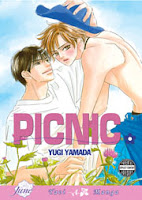 Picnic by Yugi Yamada. Once again, the titular story “Picnic” is probably the strongest manga in this collection. Or, at least it’s one of my favorites. Granted, most of the manga collected in the volume are well done. Picnic tends towards the sillier and sweeter side of things, but there are some genuinely touching moments that balance out the goofier ones quite nicely. Two of the stories feature characters from an earlier manga by Yamada which at this point hasn’t been licensed in English. (They may have also been spun off into their own series, though I’m not certain about that.) The focus of the short manga collected in Picnic is less on the plot more on the characters themselves.
Picnic by Yugi Yamada. Once again, the titular story “Picnic” is probably the strongest manga in this collection. Or, at least it’s one of my favorites. Granted, most of the manga collected in the volume are well done. Picnic tends towards the sillier and sweeter side of things, but there are some genuinely touching moments that balance out the goofier ones quite nicely. Two of the stories feature characters from an earlier manga by Yamada which at this point hasn’t been licensed in English. (They may have also been spun off into their own series, though I’m not certain about that.) The focus of the short manga collected in Picnic is less on the plot more on the characters themselves.
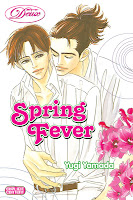 Spring Fever by Yugi Yamada. Spring Fever collects two unrelated stories by Yamada: the titular “Spring Fever” and “Wildman Blues.” The beginning of “Spring Fever” is delightfully funny before taking quite a serious turn. Yusuke is constantly falling head-over-heels for the most unlikely candidates only to be rejected again and again. This time the object of his desire happens to be an older man—a divorcé with a young son. “Wildman Blues” ties in with “Glass Sky” (and by extension Laugh Under the Sun.) Yamada once again turns her attention to Naoki. Despite all the heartache and anguish she puts him through, Yamada seems to have a fondness for the character. I’ve come to really like him, too. “Wildman Blues” provides a very satisfying conclusion to his story.
Spring Fever by Yugi Yamada. Spring Fever collects two unrelated stories by Yamada: the titular “Spring Fever” and “Wildman Blues.” The beginning of “Spring Fever” is delightfully funny before taking quite a serious turn. Yusuke is constantly falling head-over-heels for the most unlikely candidates only to be rejected again and again. This time the object of his desire happens to be an older man—a divorcé with a young son. “Wildman Blues” ties in with “Glass Sky” (and by extension Laugh Under the Sun.) Yamada once again turns her attention to Naoki. Despite all the heartache and anguish she puts him through, Yamada seems to have a fondness for the character. I’ve come to really like him, too. “Wildman Blues” provides a very satisfying conclusion to his story.
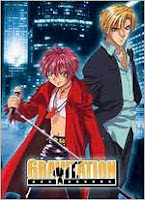 Gravitation directed by Bob Shirohata. The thirteen-episode Gravitation anime is much more even-keeled than Maki Murakami’s original manga series. The darker moments aren’t quite as dark and the humor, while still ridiculous, isn’t quite as outrageous. The anime adapts a little more than half of the manga series. I personally preferred the manga’s earlier storyline anyway, so I didn’t have a problem with the anime stopping where it did. The anime compresses and streamlines the plot of Gravitation. As a result, Shuichi and Yuki’s relationship seems a bit rushed, but for the most part the adaptation is really well done. I did wish there was a little more variety in the music, though.
Gravitation directed by Bob Shirohata. The thirteen-episode Gravitation anime is much more even-keeled than Maki Murakami’s original manga series. The darker moments aren’t quite as dark and the humor, while still ridiculous, isn’t quite as outrageous. The anime adapts a little more than half of the manga series. I personally preferred the manga’s earlier storyline anyway, so I didn’t have a problem with the anime stopping where it did. The anime compresses and streamlines the plot of Gravitation. As a result, Shuichi and Yuki’s relationship seems a bit rushed, but for the most part the adaptation is really well done. I did wish there was a little more variety in the music, though.


